Alan Morison and Chutima Sidasathian will appear on computer crime and defamation charges on July 14 after refusing to apologise to the Royal Thai Navy over a report about Myanmar's Rohingya muslim minority that was published on their online news and tourism website, Phuketwan.
The charges came about after the pair published an excerpt from a Reuters story about the trafficking and persecution of Rohingya refugees that implicated Thai ''naval forces''.
The journalists recently took a letter to Prime Minister Prayuth Chan-O-cha, and another to the Navy's commander-in-chief, expressing deep regret at what had transpired, but insist that an apology is not warranted.
''This is as close as we can go to an apology,'' said Morison, 66, who has been based in Phuket for the past seven years and is publisher and editor of the website.
''We have no intention of apologising for something that we haven't done. This is a matter of important principle. We will think about an apology if Reuters apologises.''
The rejection of the journalists' request, amid strong international condemnation of the charges, also coincided with suggestions via diplomatic channels that the charges could be quashed should the journalists issue an apology.
A foreign ministry source apparently told the journalists that in recent talks with Australian ambassador Paul Robilliard, the Thai Prime Minister suggested that the criminal defamation charge could be waived if the Phuketwan journalists found a form of words in Thai to apologise, and that he would ''take care of'' the charges laid under the Computer Crimes Act (which can only be dismissed by the Attorney-General).
In rejecting the journalists' call for the charges to be dropped, the office of Prime Minister Prayut wrote that ''because the case has already proceeded to the justice system, the court will decide this matter.''
The charges against Morison and Chutima were laid by the Royal Thai Navy and carry penalties of up to seven years' jail.
The offending report, which included a 40-word paragraph sourced from Reuters, was published in December 2013.
It said that Thai naval forces were turning a blind eye to the plight of the Rohingya refugees who have become a focus of escalating international concern.
However, Morison argues that the story simply referred to ''naval forces,'' covering a broad range of official craft operating in the area including marine police vessels, naval star vessels and Andaman coastal police.
Many of Myanmar's 1.3 million ethnic Rohingya have sought to flee persecution with the help of human traffickers, as the quasi-civilian Burmese government remains steadfast in refusing to recognise them as citizens.
''Ours is a very much secondary issue to that of the Rohingya at the moment,'' Morison said ahead of his trial.
''But the recent happenings indicate everything that Phuketwan has been reporting over the years.
''We have no intention of apologising for something that we haven't done. This is a matter of important principle.
''So, our case is now looked at as a corollary to the Rohingya issue. Most of what we have been saying is now accepted as having great validity in the context of what has been happening.''
Phuketwan has been reporting on the plight of the Rohingya for the last seven years and has won a number international awards for its investigative reports.
Ironically, Chutima, who is also a PhD student studying Rohingya anthropological ethnicity, has been asked for her expert opinion by the Prime Minister's office on several occasions recently.
She has also been assisting other news organisations, including London's Daily Telegraph, the Los Angeles Times and the ABC's Four Corners program.
As well, the Thai national also helped the Reuters correspondent whose report, which went on to win a Pulitzer Prize in the US, was used by Phuketwan and prompted the charges. Reuters and its reporters, however, have not been charged.
Morison said he found it perplexing that Chutima had recently received a letter of thanks from the Thai Government for providing advice on the Rohingya issue while at the same time the Prime Minister was refusing to dismiss the charges.
''Apparently we are expected to cringe and be grateful for the mercy of the Royal Thai Navy, who only want us to apologise for something we haven't done,'' he said.
A spokesperson for the Department of Foreign Affairs and Trade told The Citizen that Australian consular officials in Thailand were continuing to provide consular assistance to Morison and had made more than 30 representations to Thai authorities on his behalf.
While remaining hopeful of a resolution ahead of next week's trial, Morison was critical of the Australian government's efforts, saying there was no clear means for dealing with an issue that ''breaks the mould and is a clear-cut matter of principle''.
''There is no mechanism in Canberra for actually delineating a matter of principle from all other cases of drug smugglers and pedophiles,'' he said.
The trial, in the Phuket Provincial Court, will be held over three days from next Tuesday (July 14).
The court has rejected Morison's request for open coverage of the trial, despite intense international media interest.
Observers and media are expected to apply individually for space, with the courtroom likely to hold a maximum of 40 people, according to Morison.
The charging of the Phuketwan journalists has been widely criticised by international media and human rights groups, including the United Nations Human Rights Commission.
A recent statement issued by the International Commission of Jurists, a body composed of 60 eminent judges and lawyers from across the world, called for Thailand to drop the charges against the pair.
The journalists say they fear that they may not receive a fair trial considering the military government's present stance on media freedom.
Morison says that the closure of Phuketwan was a real possibility should he be jailed.
Phuketwan journalists Alan Morison and Chutima Sidasathian say there is no justification for the criminal charges laid against them by the Royal Thai Navy.
Republished by permission from thecitizen.org.au



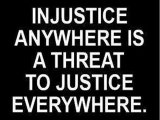
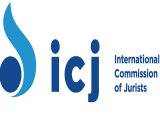
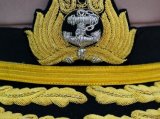
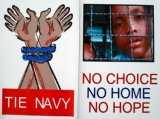
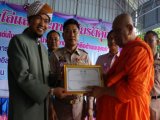
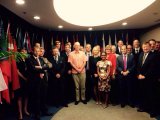
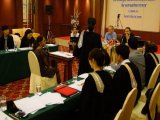



Dear Ed
As the self-appointed fact check Nazi I should point out that Phuketwan reprinted the relevant Reuters 41-word paragraph on 17 July 2013 and not in December 2013, despite what the above story suggests.
Reuters itself published a story on 5 December 2013 that was more critical of the Royal Thai Navy. See my comments under the story Journalists Facing Jail in Thailand Need More Help, Says Rights Group.
Like some other stories the above story can be misinterpreted when a journalist tries to paraphrase what was in the Phuketwan story of 17 July 2013. In addition misinterpretations can occur when it is not clear whether a journalist is referring to a given paragraph or to a Phuketwan story or to a Reuters story or to a series of Reuters stories.
A journalist might write I LIKE WHITE HORSES AND CARS. A picky lawyer might reasonably ask whether this means I LIKE WHITE HORSES AND WHITE CARS or I LIKE WHITE HORSES AND CARS OF ANY COLOUR.
There had already been more than enough confusion and enough drama caused in part by a poor translation of "Thai naval forces" to "Royal Thai Navy."
We do not need any more confusion.
Posted by Ian Yarwood on July 8, 2015 16:39
Editor Comment:
Thanks, Ian.